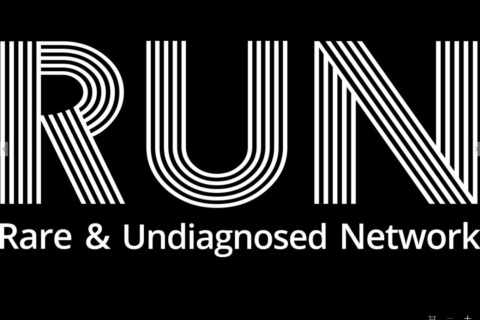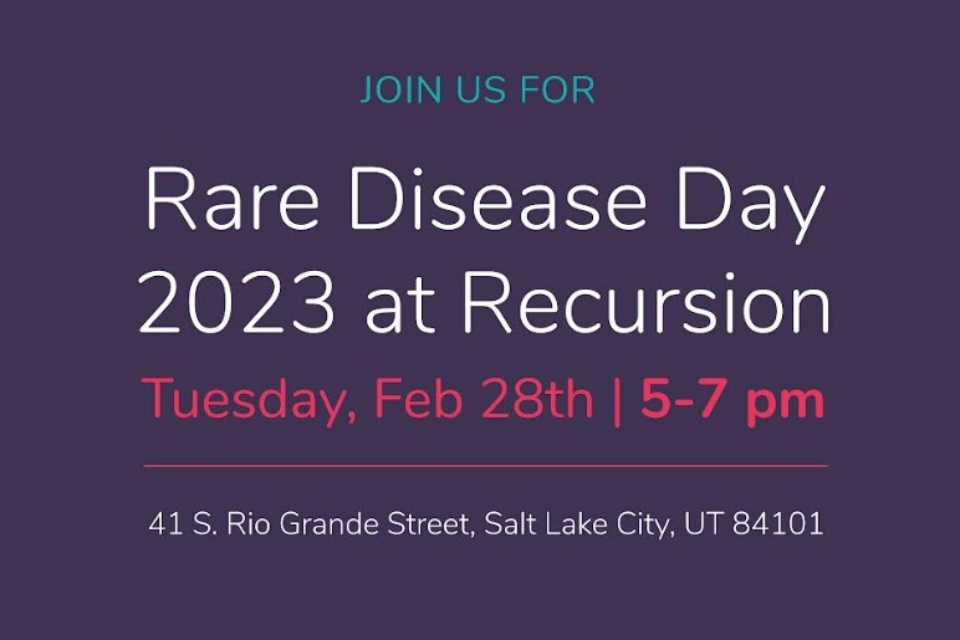Utah Rare Disease Day on Tuesday, February 28th
Community leaders unite to provide support and resources for thousands of Utahns with Rare Diseases
Registration for the event is now closed. We will have a virtual link coming soon.
For questions, please email ginaszajnuk@gmail.com

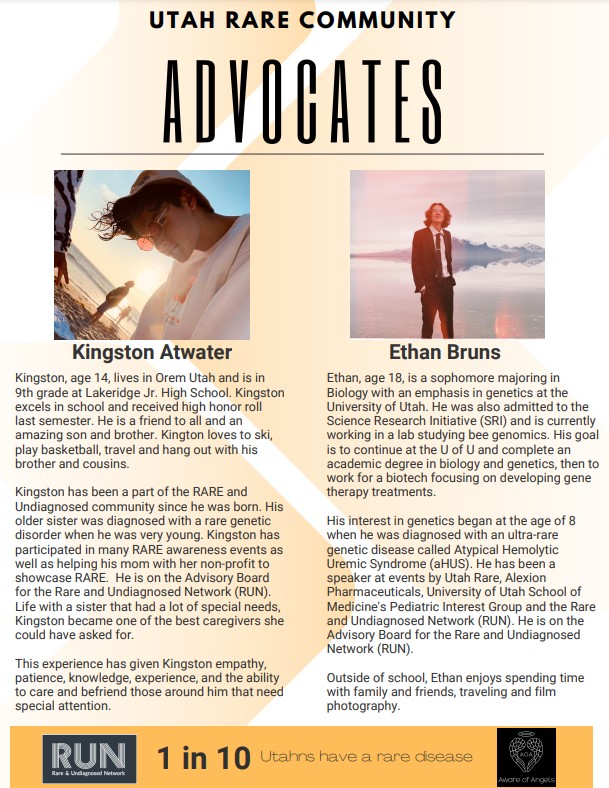
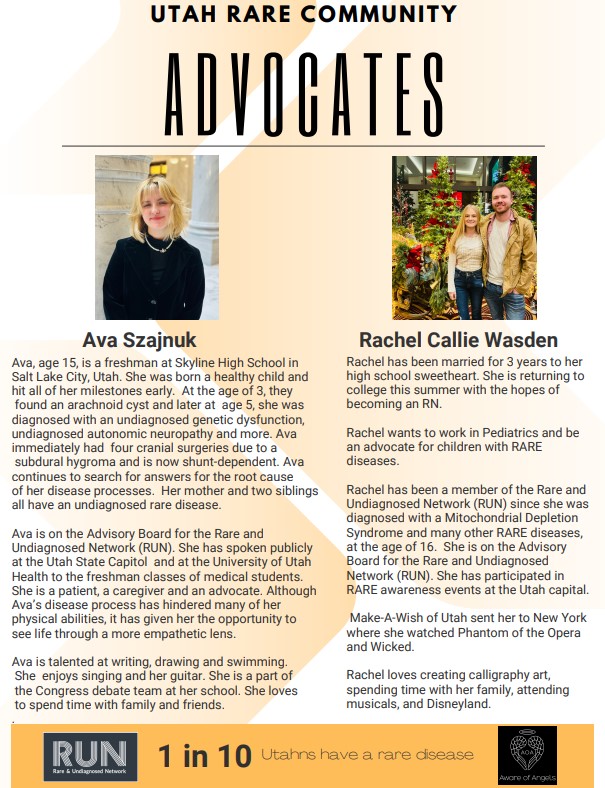
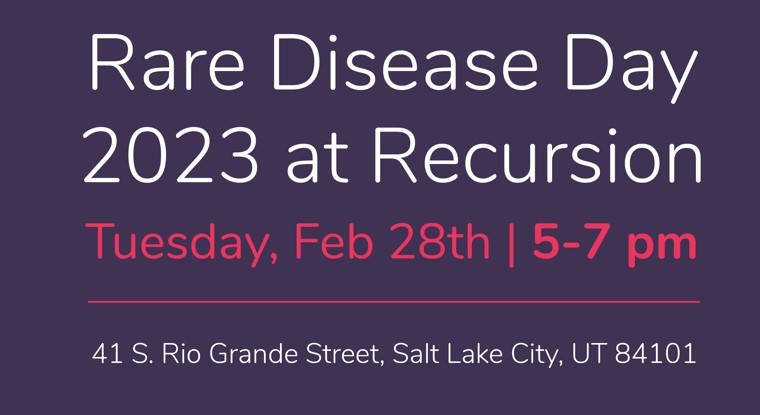
Utah Rare Disease Day Press Release
Media Contacts:
Recursion Pharmaceuticals: Ryan Kelly, (610) 442-1896, ryan.kelly@recursionpharma.com
Rare and Undiagnosed Network (RUN): Gina Zanik, (310) 883-4353, ginaszajnuk@gmail.com
Global Genes: Tom Hume, tom.hume@globalgenes.org
Community leaders unite to provide support and resources for thousands of Utahns with Rare Diseases
SALT LAKE CITY (February 21, 2023) – Rare Disease advocacy organizations and biotech and healthcare industry leaders will partner to accelerate the diagnosis and improve the care of more than 344,000 Utahns living with a rare disease. On Rare Disease Day, Feb. 28, 2023, community leaders will host a free event from 5 to 7 p.m. at Recursion Headquarters, 41 South Rio Grande Street in Salt Lake City to provide support and resources for those living or impacted by a rare disease. Additionally, Gov. Spencer J. Cox will declare February 28, 2023 Rare Disease Day in the State of Utah.
Rare disease is considered a condition with less than 200,000 patients. More than 10,000 rare diseases are known, most of which are genetic in nature. An estimated one in ten people in the United States have a rare disease. Today, 95 percent of rare diseases have no treatment.
The Utah Rare Disease Day event will raise awareness for rare and undiagnosed diseases and the lifelong impact they have on patients and their families – while highlighting progress in diagnosis and treatment discovery. Organizers will recognize advocates who have been instrumental in building Utah’s rare disease community and have dedicated themselves to support this important work.
“The Beehive State is buzzing with activity to address the needs of patients with rare diseases. From the use of artificial intelligence to cutting-edge genomics, the state is fertile ground for innovation to drive needed advances,” said Charlene Son Rigby, CEO of Global Genes. “By joining with patient organizations, drug developers, and researchers in Utah to mark Rare Disease Day, we hope to raise awareness about these conditions and the collaborative efforts essential to improving the lives of rare disease patients and their families.”
“There is an urgency for diagnoses, treatment and cures for the rare disease community,” said Gina Zanik, co-founder and executive director of Rare and Undiagnosed Network and Vice Chair of the Utah Rare Disease Advisory Council. “The diagnostic odyssey for someone with a rare disease takes on average seven years. We must shorten the length of the diagnostic journey and come together to support patients and their families throughout the duration.”
Rare Disease Day is an annual observance on the last day of February. A series of events will be held globally to raise awareness, strengthen the rare disease community, and advocate for needed changes to improve the lives of the 400 million people around the world who suffer from these conditions.
Rare disease patients will come together with the RARE and Undiagnosed Network (RUN), Aware of Angels, Global Genes, RARE-X, BioUtah, BioHive, Recursion, Metrodora Institute, ARUP, the University of Utah and the Rare Disease Advisory Council (RDAC). The coalition of organizations represents Utah’s strong collaborative ecosystem dedicated to coordinating, advocating, and promoting the interest of those living with rare diseases.
One company in this collaborative ecosystem is Recursion, a Salt Lake based biotech which is reimagining drug discovery and development through the integration of advances in biology, chemistry, automation, data science, and engineering.
“Recursion was founded to reinvent the drug development and discovery process with an early focus on rare diseases,” said Chris Gibson, co-founder and CEO of Recursion. “The status quo is failing to meet the needs of millions of patients with rare diseases and we are harnessing technologies like artificial intelligence to accelerate the process of bringing new therapies to patients who need them.”
Rare Disease Day is the globally coordinated movement on rare diseases, working towards equity in social opportunity, healthcare, and access to diagnosis and therapies for people living with a rare disease.
Since its creation in 2008, Rare Disease Day has played a critical part in building an international rare disease community that is multi-disease, global, and diverse– but united in purpose. Rare Disease Day is observed every year on 28 February (or 29 in leap years)—the rarest day of the year. Rare Disease Day was set up and is coordinated by EURORDIS and 65+ national alliance patient organization partners. Rare Disease Day provides an energy and focal point that enables rare diseases advocacy work to progress on the local, national and international levels.
Though Rare Disease Day is patient-led, everyone, including individuals, families, caregivers, healthcare professionals, researchers, clinicians, policy makers, industry representatives and the general public, can participate in raising awareness and taking action today for this vulnerable population who require immediate and urgent attention.
By Sharing your colors via social media, events, illuminating buildings, monuments and homes, by sharing experiences online and with friends, by calling on policy makers and shining the light on people living with a rare disease, collectively we aim to change and improve lives of the 400 million people worldwide.
To Access National Organization for Rare Disorders (NORD) Downloads
Learn more at www.rarediseaseday.org
To Access Global Genes Rare Disease Day Kit
Rare and Undiagnosed Resources
Global Genes RARE Concierge Service
The EveryLife Foundation for Rare Diseases
Genetic and Rare Diseases (GARD)
National Organization for Rare Disorders (NORD)
Rare Disease Legislative Advocates
Rare and Undiagnosed Network (RUN) Resources
Undiagnosed Disease Network (UDN)
Undiagnosed Disease Network Foundation (UDNF)
Undiagnosed Disease Network International (UDNI)
University of Utah Health’s Penelope Program
Contact information: Gina Zanik (Szajnuk)
Co-founder and Executive Director
Rare and Undiagnosed Network (RUN)
E: ginaszajnuk@gmail.com
C: (310) 883-4353
